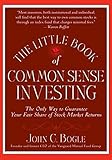And by "done well" I do not mean predicting ups and downs, but having a diversified portfolio (investing everything in one company is not a good idea, does not matter how promising or established it looks), which is doable with all the investment funds out there that ask for a very low minimum investment.
Check these books:
http://www.amazon.com/Intelligent-Investor-Definitive-Invest...
http://www.amazon.com/Little-Book-Common-Sense-Investing/dp/...
http://www.bogleheads.org/wiki/Three-fund_portfolio
Keep in mind, though, that there are no guarantees. Stocks will have bad years, and you should expect that some years they will lose 50% of their value. The key is to choose an allocation that you can live with so you don't panic and sell when things get bad. Keep contributing and rebalance regularly (once or twice a year is usually enough). Tune out all the noise and stick to your plan. Even with these dips, most people expect stocks to perform better than any other asset class in the long term (20+ years).
I'd also recommend The Little Book of Common Sense Investing:
http://www.amazon.com/dp/0470102101
It's written by John Bogle, who founded Vanguard to bring diversified, low-cost investing to the masses. Vanguard is different from other companies in that it's client-owned. The Bogleheads forum is pretty good for this kind of investment advice:
You might also check out Wealthfront and Betterment. They are software-based financial advisors that use Modern Portfolio Theory and the Black-Litterman model to allocate your money optimally given their assumptions about expected returns and correlations between asset classes:
http://www.blacklitterman.org/intro.html
https://www.wealthfront.com/whitepapers/investment-methodolo...
Check out http://www.indexuniverse.com/sections/news/6012-bogle-invest... to see how Vanguard's ETFs performed against Vanguard's index funds (in short, not well).
I agree with Adams that index based investing is a great idea for hands off people, but do yourselves a favor and read Bogle's seminal book on index investing: http://www.amazon.com/Little-Book-Common-Sense-Investing/dp/... first.
It's very concise but it will serve you well.


https://www.amazon.com/Little-Book-Common-Sense-Investing/dp...